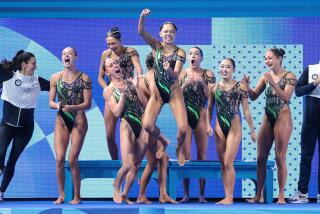Did China Use Drugs to Win? : Swimming: Sudden success prompts speculation that its female athletes might have been taking steroids.
- Share via
National swim team coaches from the United States, Hong Kong and Australia suspect the Chinese women’s team of using steroids in the wake of China’s world-best performances during last month’s Asian Games.
Richard Quick, coach of the U.S. national team and Stanford women’s team, said he felt obligated to speak out after the Chinese produced three times that rank No. 1 in the world this year and three others that are No. 2 during the competition at Beijing.
“I got tired of whispering about it with the East Germans, and I’m not going to whisper about it with the Chinese,” Quick said during the weekend. “I think they’ve improved very quickly. I know some coaches who have watched them, and their ability to recover in practice is phenomenal. It is either extremely sophisticated training with the proper nutrition and massage, or it is with artificial aids.”
Said Australia’s national team coach, Bill Sweetenham, who worked with the Chinese as recently as February: “I hope they are not doing it (using steroids), but I question their rapid improvement.
“I am a very positive advocate of the Chinese, their strict discipline and the Spartan attitude toward their training. Their high-altitude training is very significant, as is the socialist system. You are dealing with people who have nothing, and all of a sudden if they perform well they get something.”
The suspicions have been fueled by the quick improvement of the Chinese performances and what the coaches consider a familiar pattern. “It seems like we’re seeing the same rapid improvement the East Germans had, and they (the Chinese) had help from the East Germans,” said Sweetenham, Australia’s Olympic coach from 1980-88.
According to Coach David Haller, whose Hong Kong national team swam against the Chinese during the Asian Games, the Chinese women have made significant weight gains and developed deep voices. Those are common side effects of steroids, muscle-building drugs that some consider to be performance-enhancing.
China’s national team coach, Yunpeng Chen, denied the allegations from Beijing.
“Never,” Chen said. “In China, our swimming association forbids it, and you know at the Asian Games we have serious doping control.”
None of the Chinese swimmers tested positive for any banned substance at the competition.
Chen said his team has had East German help. East German Coach Klaus Rudolf went to China in 1986 for eight months to share training techniques. Chen also learned from the Americans during 1979-80 when he studied at Springfield College in Massachusetts, and from the Australians in 1983 when he observed Coach Dennis Pursley’s methods.
“I learned a lot about the East German system of weight training, high-altitude training, dry-land and aquatic training,” Chen said. “Then I mixed the Australian, U.S.A. and East German training methods to make the Chinese method.”
Pursley, because of his current position as U.S. national team director, would not address the question of steroids with regard to the Chinese. However, he did attend the Asian Games and was willing to share his views of the Chinese program, which Chen said has about 25,000 swimmers. The Chinese population is estimated at 1.1 billion.
“The thing that really surprised me is that they really haven’t scratched the surface,” Pursley said. “They have a small number of swimmers and they don’t have sophisticated talent identification or networking methods.”
In a report Pursley prepared for U.S. Swimming, he wrote: “It doesn’t appear that the success of the Chinese program can be attributed to any ‘secret’ training methods that are unknown to the rest of the world. The training program is based on a solid work ethic and utilizes traditional methods of preparation.”
Quick also credits the Chinese training, saying that the swimmers could not improve on artificial aids alone.
“The major benefit from steroids is that you can train so much more effectively so many more times,” he said. “So you can get off them in time before the competition.”
Quick added that female swimmers benefit from steroids more than males.
“And (improvement) has come in the power events first, the shorter events, the 100s, and then the 200s,” he said.
Dr. Robert Voy, former chief medical officer of the U.S. Olympic Committee, gives credence to Quick’s belief that steroids have a greater impact on women.
“Women have male hormone receptor sites that require very little male hormone to fill,” Voy said. “They can get that by using smaller doses and getting bigger gains.”
Chen, however, offered several reasons for the success of the women as opposed to the men, including the belief that the fastest women can train against faster men while the fastest men have no one to push them.
He also pointed out that the average height of Chinese women is only an inch shorter, at 5 feet 8, than the average height of female finalists in the 1988 Olympic Games.
He says the average height of the Chinese male swimmer is 5-11, three inches shorter than the average height of male Olympic finalists in 1988.
With regard to power events, the only world record the Chinese women have is in the shortest event, the 50-meter freestyle.
Wenyi Yang, who set the mark at 24.98 seconds in 1988, has gone as fast as 25.51 this year and is one of five Chinese women with world-best times in 1990.
The others are: Yong Zhuang in the 100 freestyle (55.12), Xiaomin Huang in the 100 breaststroke (1:09.70), Xiaohong Wang in the 100 butterfly (58.87) and Li Lin in the 200 individual medley (2:13.16). Wang’s time and the 58.89 turned in by teammate Hong Qian represent the second- and third-fastest times in history behind the world record of 57.93 set by Mary T. Meagher of the United States in 1981.
The United States has seven individual world bests this year--four by freestyler Janet Evans, two by butterflyer-medleyist Summer Sanders and one by 100 backstroker Betsy Mitchell. This year’s other bests are by Hungarian 200 backstroker Kristina Egerszegi and 200 breaststroker Elena Volkova of the Soviet Union.
Quick fears steroid users will not be caught through the testing procedures at the World Championships or the 1992 Olympic Games in Barcelona, Spain.
One former member of the East German women’s team acknowledged in a Toronto Sun article recently that she used steroids and said that many of her teammates used the banned substances, but none of the swimmers tested positive during competition. During the U.S. Olympic trials in 1988, Angel Myers tested positive for a banned substance and was taken off the team, but those cases are generally the exception.
Said Voy: “Only someone who misjudges a dose or gets greedy and takes too much, a la Ben Johnson, is going to get caught. With an eight- to 10-week cycle they can get off within two weeks of the competition date and still get a lot of the positive effects of the drug.”
More to Read
Go beyond the scoreboard
Get the latest on L.A.'s teams in the daily Sports Report newsletter.
You may occasionally receive promotional content from the Los Angeles Times.






